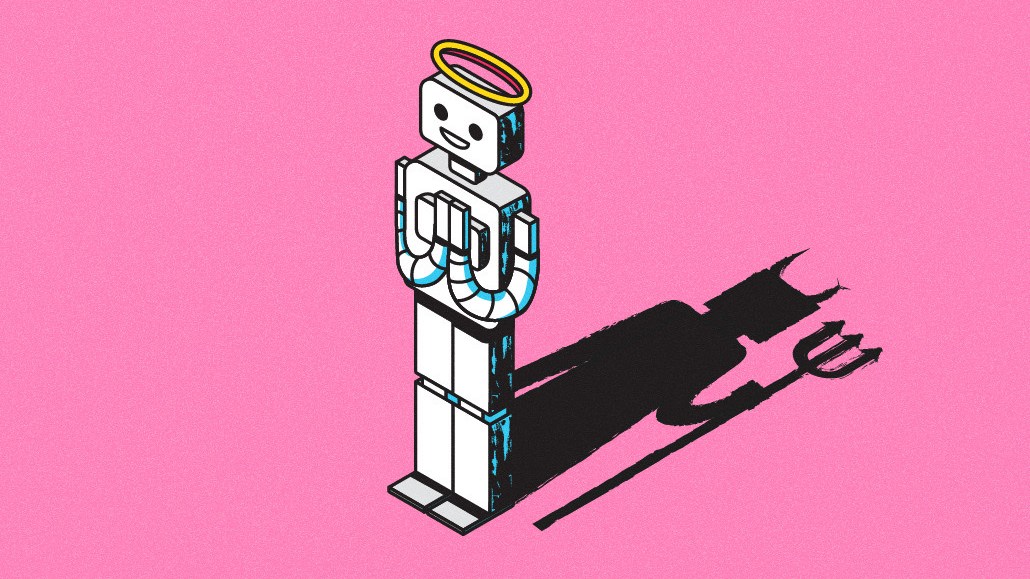Secure your place at the Digiday Media Buying Summit in Nashville, March 2-4
What’s stopping big brands like Pepsi and Frito-Lay from embracing AI?

Since OpenAI launched ChatGPT last November, the marketing industry seems to have embraced that generative artificial intelligence is poised to have a place in the future of advertising. However, nearly a year into the hype cycle, mainstream brands like Pepsi, Frito-Lay and La-Z-Boy remain tentative to adopt the technology, seemingly wary of brand safety, copyright and data privacy issues.
AI-powered tools are touted as making marketing better, faster and cheaper, expediting tasks like copywriting and visual and audio production. At least 71% of ad agencies are already embracing generative AI, per recent Digiday+ Research. However, there doesn’t seem to be a clear consensus among marketers about how these tools should be used, and they’re either cautiously approaching AI-enabled tech or not approaching it at all.
“Obviously, there’s some stuff that we can test and we can look at, and learn from,” said Todd Kaplan, CMO of Pepsi. “But the technology, while very exciting and will be very important in years to come, it’s still proving out and it’s still at the very nascent stage in terms of what it can be.”
Parent company PepsiCo is reportedly embracing AI, spending “hundreds of millions” of dollars to employ the technology to create new product lines and flavors, analyze sales and more, according to Axios. Its competitor Coca-Cola recently appointed Pratik Thakar as the company’s senior director of generative AI. However, Kaplan said the beverage brand Pepsi itself is taking a wait-and-see approach until AI-powered tools can be better scaled. “It’s where it’ll make a big difference in terms of how we look at it moving forward,” he said.
It’s a similar story at snack brand Frito-Lay, another subsidiary of PepsiCo, according to Chris Bellinger, vp of creative and digital at Frito-Lay North America and Quaker, who said Frito-Lay is approaching generative AI with caution. “We’re just being extremely cautious knowing all the different elements that exist within it, all the different nuances,” he said.
For furniture brand La-Z-Boy, the company has yet to explore AI beyond The Decliner, an AI-powered recliner, which is part of a recent marketing campaign.
When new technology is involved, bigger companies are often labeled as being risk-averse, and AI comes with inherent risk since it still brings with it so many unknowns, from uncertainty about what even counts as AI to concerns about data and copyright issues. Until it’s proven that AI helps companies better connect to shoppers and further scale, it’s limited to experimentation at best, Kaplan said.
“When you talk about just using the word AI, it means a lot of things and that’s a scary thought to a lot of people,” said Ming Chan, founder and CEO of digital agency The1stMovement.
Seemingly, hesitancy is a common theme as the industry also teeters on the cusp of Web3, or what’s expected to be the next iteration of the internet. Thus far, AI-powered tools like ChatGPT and its competitors, like Meta’s Llama 2 or Elon Musk’s new AI company xAI, are enclosed in a black box. In other words, humans have yet to understand just how AI systems and their decision-making processes work. And as the AI hype surges, so do marketers’ brand-safety worries.
“It should also be noted that while the hype is real for AI-enabled tools, there’s very few validated case studies that prove the return on investment is worth the potential risks,” Mike Nellis, CEO of Authentic and founder of AI campaign tool Quiller, said in an email.
However, Nellis added, big brands who remain hesitant to invest in emerging technology may find themselves behind the curve, competing with smaller and more noble brands that are more willing to take a risk.
“AI has the potential to become a great equalizer for competing brands that don’t have the financial or operational advantages of companies like Pepsi,” he said. “That’s the inherent risk of the wait-and-see approach for technology like this.”
With that said, a number of brands have broken out of AI purgatory, entering the so-called test-and-learn phase of generative AI sooner rather than later. For example, tech brand Lenovo is testing AI behind the scenes, ensuring “that it’s not a big black box,” before committing to AI-powered tools and strategies, said Rick Corteville, executive lead of global media of the center of excellence at Lenovo. The company is looking to leverage AI to optimize creative campaigns, but declined to outline specific details.
Airline JetBlue is also using AI to help scale targeted marketing efforts and customer segmentation. Still, like Lenovo, the company acknowledges the unknowns, and is treading lightly in this next wave of tech, per Jayne O’Brien, head of marketing, product and loyalty at JetBlue. “At the moment, we’re all staring into this black box of what is it, where’s it going and we’re none of us have the crystal ball to look at,” she said.
More in Marketing

Future of Marketing Briefing: AI’s branding problem is why marketers keep it off the label
The reputational downside is clearer than the branding upside, which makes discretion the safer strategy.

While holdcos build ‘death stars of content,’ indie creative agencies take alternative routes
Indie agencies and the holding company sector were once bound together. The Super Bowl and WPP’s latest remodeling plans show they’re heading in different directions.

How Boll & Branch leverages AI for operational and creative tasks
Boll & Branch first and foremost uses AI to manage workflows across teams.







